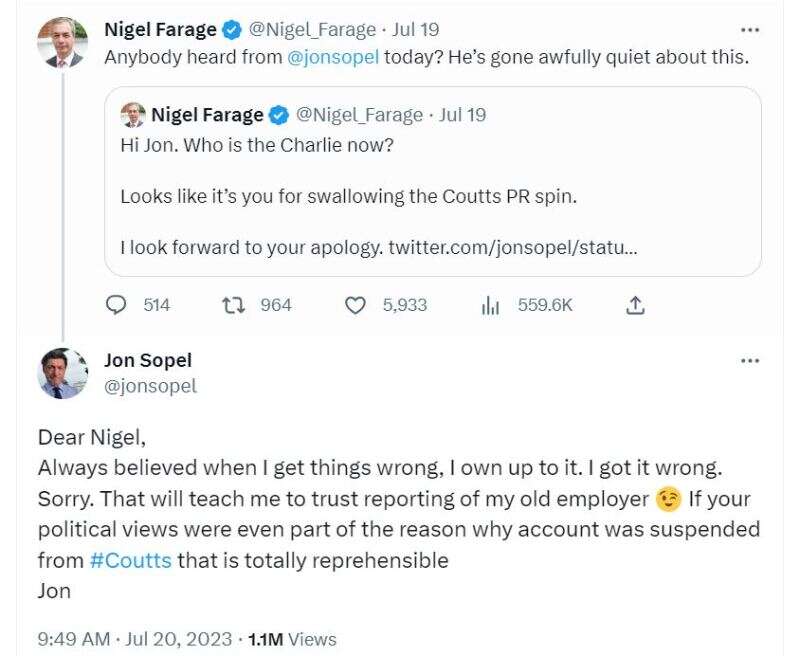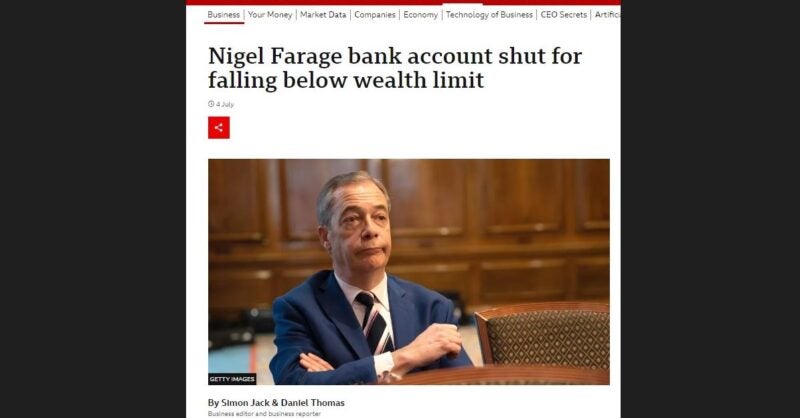The BBC has amended a report which stated Nigel Farage’s Coutts bank account was closed for financial reasons.
But it has so far stopped short of providing Farage with the apology he has demanded.
Former UKIP leader Farage first revealed in June that he believed his bank account had been closed for political reasons.
On 4 July, the BBC reported in an online headline: “Nigel Farage bank account shut for falling below wealth limit.”
The article quoted “people familiar with the Coutts’ move”, saying it was “a commercial decision”. The BBC report quoted an unnamed source as saying: “The criteria for holding a Coutts accounts are clear from the bank’s website.”
The article, by business editor Simon Jack and business reporter Daniel Thomas, has now been amended with the new headline reading: “Nigel Farage bank account shut for falling below wealth limit, source tells BBC.”
The article has also been given the following update: “Since this article was published, Nigel Farage submitted a subject access request to Coutts bank and obtained a report from the bank’s reputational risk committee.
Content from our partners
“While it mentioned commercial considerations, the document also said the committee did not think continuing to have Mr Farage as a client was ‘compatible with Coutts given his publicly-stated views that were at odds with our position as an inclusive organisation’.
“We have amended this article’s headline to make clear that the details about the closure of Nigel Farage’s bank account came from a source.”
Farage used the Data Protection Act to demand Coutts release all files held about him. Some 36 pages of evidence were shared with the Daily Mail which make clear political and reputational considerations came into play when deciding to drop Farage as a customer.
Jon Sopel ‘sorry’ he trusted BBC reporting
The 4 July BBC report led to Farage being widely ridiculed on social media, including by former BBC journalist Jon Sopel who said on Twitter: “You must feel a bit of a Charlie if you’re Nigel Farage, and you claim that it’s all an establishment stitch up that your account’s been closed when it’s just you’re not rich enough for Coutt’s.
“Am thinking of starting a ‘go fund me’ page for Nige to get him his account back.”
Sopel has now tweeted an apology to Farage saying: “That will teach me too trust the repprting of my old employer” and stating the actions of Coutts were “totally reprehensible”.
Sopel’s initial tweet has been viewed some 3.2 million times while is apology has received just over one million views.

Chief executive of Coutts owner Natwest Group Dame Alison Rose has also apologised to GB News host Farage and HM Treasury has said it will tighten the rules around banks and account closures.
BBC use of anonymous sources again in question
Meanwhile, Rose faces questions over whether she was the source for the inaccurate 4 July BBC report.
The Telegraph has reported that Jack sat next to Rose at a dinner on 3 July.
And Farage has said: “I want to know, did Alison Rose breach my client confidentiality? Did she break GDPR rules?”
The BBC has not responded to a question from Press Gazette asking whether the 4 July report will be subject to a formal standards investigation.
The BBC and other publishers have tight guidelines around use of sources to guard against anonymous sniping from those with an axe to grind.
[Read more: When is off the record out of order?]
In the run up to the 2003 Iraq war many journalists felt they were deceived by intelligence sources who insisted on remaining anonymous and misled them about Saddam Hussein’s capacity to use weapons of mass destruction.
The BBC’s editorial standards state: “All BBC output, as appropriate to its subject and nature, must be well sourced, based on sound evidence, and corroborated.
“We should be reluctant to rely on a single source. If we do rely on a single source, it should be credible, and a named, on-the-record source is always preferable.”
Email pged@pressgazette.co.uk to point out mistakes, provide story tips or send in a letter for publication on our “Letters Page” blog
